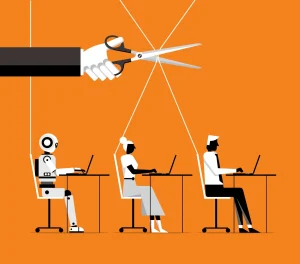Remember when tech workers had all the power? The Great Resignation era where engineers could write their own tickets and data scientists jumped ship for 20% raises? Those days are gone. Welcome to “The Great Stay”, where tech professionals aren’t staying because they want to, but because they have to.
From Mobility to Immobility
The numbers tell a stark story. According to Indeed’s Tech Talent Report 2025, 31% of tech workers now worry about layoffs at their companies, and more troubling, 35% fear AI could take over their roles entirely. For Gen Z workers, that number jumps to 38%, nearly two in five young professionals starting their careers already wondering if they’ll have one in five years.
The pandemic hiring frenzy created unrealistic expectations. Between 2019 and 2022, Amazon’s workforce doubled by 106% and Meta’s grew by 103%, according to a CNN report. Those same companies that couldn’t hire fast enough started pulling back hard, erasing workforce gains and creating a climate of constant uncertainty.
But the raw statistics don’t capture the human reality behind The Great Stay. One developer captured the sentiment perfectly: “The word ‘stay’ implies agency. But how can we have agency if we can’t get another job even if we try? I’m stuck in my current job and can’t get out.”
The AI Anxiety Multiplier
Every week brings fresh evidence feeding the fear cycle. Salesforce laid off 4,000 customer support roles while CEO Marc Benioff bluntly stated “I need less heads” thanks to AI capabilities. Accenture announced rapid exits for workers who couldn’t reskill on AI fast enough. Lufthansa plans to eliminate 4,000 jobs by 2030 as it leans on AI for efficiency.
When 26% of tech professionals report colleagues being let go specifically because of AI, according to the same Indeed survey, it’s no wonder the calculus has changed. The risk-reward equation that used to favor jumping ship now screams “stay put.”
“Most tech workers do not want to quit right now, because it’s such a risky time to find a new job”, says Steve Morris, founder and CEO at NewMedia.com. “And those who do have a say in how AI is deployed in their teams are, on average, happier about it.”
The Brutal Job Market Reality
The data reveals a market that’s fundamentally shifted against job seekers. Workday’s research shows that while hiring demand in tech remains relatively high, with new requisition volume growing 29% year-over-year, the reality on the ground is brutal. More than half of open roles (57%) take over 30 days to fill, and each job offer attracts an average of 40 applications.
That hyper-competition creates what career experts call “the better-the-devil-you-know” syndrome. When people have bills to pay and responsibilities, the uncertainty of changing jobs becomes mathematically terrifying compared to staying in a known, if imperfect, situation.
The paradox is glaring: workers fear being replaced by AI, yet many are staying precisely to help build the systems that could displace them. It’s a survival strategy born of scarcity, upskill within your current role or risk becoming obsolete outside it.
The “Scapegoating” Controversy
Here’s where the narrative gets complicated. Some experts argue AI is taking more blame than it deserves for what are fundamentally economic adjustments.
Fabian Stephany, assistant professor of AI and work at the Oxford Internet Institute, calls this “scapegoating.” “I’m really skeptical whether the layoffs that we see currently are really due to true efficiency gains”, he told CNBC. “It’s rather really a projection into AI in the sense of ‘We can use AI to make good excuses.'”
The numbers back this skepticism. Research from Yale University’s Budget Lab shows U.S. labor has seen little actual disruption from AI automation since ChatGPT’s 2022 release. When measured against other technological shifts like computers and the internet, the occupational mix, the share of workers in different jobs, has barely budged.
New York Fed economists found similar patterns: only 1% of service firms reported AI as the reason for layoffs in the past six months, down from 10% in 2024. Meanwhile, 35% of services firms have used AI to retrain employees and 11% have hired more as a result.
The Real Reasons Behind The Great Stay
Beyond AI anxiety, multiple factors are cementing tech workers in place:
Compensation and security have become paramount in an uncertain economy. Stable packages with benefits are outweighing the allure of potentially higher salaries elsewhere.
Workplace culture matters more when the external market feels risky. Employees prioritize environments where they feel valued and supported.
Upskilling investments from employers create loyalty. Companies pouring resources into training create explicit career pathways that discourage departure.
Economic volatility makes any change feel dangerous. When adjacent sectors face layoffs and restructuring, the perceived stability of current roles becomes priceless.
Caroline Stokes, workplace author and coach, describes it as “a cacophony of unstable environments, tariffs, AI, geopolitics, that are making people stay, make do, or lock in, all for the wrong reasons.”
The Innovation Paradox
Here’s the real concern for the tech industry: when fear dictates behavior more than ambition, what happens to innovation?
Productivity hasn’t cratered despite record-low job satisfaction across tech. But fear and uncertainty, not motivation, have become the primary performance drivers. The rise of extreme work cultures, like the 996 system creeping into Silicon Valley AI startups, shows how “stability” now comes with a cost.
Some reports describe tech employees working 100-hour weeks to stay relevant in the AI race. When teams are stretched thin as layoffs pile more work on fewer people, what was once freedom, flexible work, lucrative roles, endless options, now feels like a trap.
Navigating The Great Stay
For tech workers caught in this dynamic, several strategies emerge:
Upskill strategically, focus on skills that AI complements rather than replaces. Distributed computing, machine learning frameworks, model deployment, and site reliability engineering remain in high demand despite overall hiring cooling.
Build domain expertise, while AI can handle generic tasks, deep company and industry knowledge creates moats that automation struggles to cross.
Embrace the builder role, those helping implement AI systems have more job security than those resisting the technology’s advance.
Consider internal mobility, lateral moves within organizations often provide growth opportunities without the risk of external job hunting.
The Future of Tech Work
The Great Stay might sound like a pause, a cooling-off period after the frenzy of the Great Resignation. But in tech, it’s something more troubling: a reflection of an industry that’s lost its identity and sense of balance.
Workers are no longer chasing purpose or passion. They’re calculating risk, watching LinkedIn feeds fill with layoff posts, and hoping the next algorithm won’t make them obsolete. The irony is palpable, an industry built on disruption has made its own workforce afraid of change.
As one tech professional summarized the sentiment: “I’ve been through 15 interview loops this year with zero offers. Constant rejection, my background and skills notwithstanding. We’re stuck. This is the Great Stuck.”
Whether The Great Stay becomes a temporary lull or a lasting shift depends on how tech employers respond. Companies can leverage this period to invest in their workforce, create meaningful development paths, and build loyalty through genuine support. Or they can watch as their most talented people eventually leave, not for better offers, but for any opportunity to escape the stagnation.
The choice isn’t just about retaining talent, it’s about whether the tech industry rediscovers what made it revolutionary in the first place, or settles into being just another place people go to collect a paycheck while waiting for the next disruption to make them redundant.




